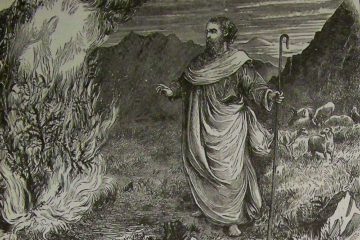Sermon: Heaven on Earth
Sermon Texts
Psalm 119:129-136
Matthew 13:31-33,44-52
In the name of the one, holy and undivided Trinity: Father, Son and Holy Spirit. Amen.
Before we talk about today’s gospel, I want to briefly take you back in time, to September 14, 1987. On that day, a pop single was released to the US airwaves that would eventually reach #1 on the Billboard charts. What made this hit song unique is that, within its chorus, it contained a profound and theologically correct statement about the End Times — which is unusual for popular music. It’s also a really catchy earworm that is still well known 30-odd years later.
I can’t sing it for you because of the pandemic — I know you’re all disappointed — but I will read out the chorus for you:
Ooh, baby, do you know what that’s worth?
Ooh, heaven is a place on earth
They say in heaven love comes first
We’ll make heaven a place on earth
The song, of course, is “Heaven is a Place on Earth” by Belinda Carlisle.
I bring this song up because it illustrates an important, but often-overlooked, Christian doctrine about our eternal life. Most of us hold on to a very straightforward kind of view about heaven: When you die, if you’re good — or if you have the right beliefs — you go up to heaven. And while that view is not wrong, there is more to the story.
In our creeds, we profess a faith in “the resurrection of the body and the life everlasting.” And in our Holy Scripture, we find prophecy about the restoration and perfection of life here on earth. God told the Prophet Isaiah, Isaiah 65, “I am about to create new heavens and a new earth … no more shall the sound of weeping be heard in it, or the cry of distress … they shall not hurt or destroy on all my holy mountain.”
And in the Book of Revelation, chapter 21: “I saw a new heaven and a new earth … and I heard a loud voice from the throne saying, ‘See, the home of God is among mortals … he will wipe every tear from their eyes … death will be no more, mourning and crying and pain will be no more … See, I am making all things new!'”
All of this points to a heaven-like existence on an earth that is restored and made whole again, as God intended. Heaven will be a place on earth. And it wouldn’t be earth without the people — we make heaven a place on earth. And God’s law of love — remember that Jesus quoted the greatest commandments in the Law, “Love God and Love your neighbor.” In heaven, love comes first.
See, it’s unusual for a pop song to be that spot-on.
Now, let’s turn to the five parables of Jesus that we heard today. Jesus is famous for teaching in parables, and many of his parables are well known around the world — even among non-Christians — for their sound ethical teaching. Parables like “The Good Samaritan”, “The Lost Sheep”, “The Prodigal Son”, and that one about the Camel and the Eye of the Needle. All of these parables represent our Lord teaching us how we need to behave.
Today’s parables aren’t quite so popular — probably because they don’t teach us how to behave — instead, they teach us what the kingdom of heaven is like. (This is why I brought up Belinda Carlisle.) The first two parables — the mustard seed and the yeast — are teachings about how God can create big growth out of even small things … perhaps they are a reminder that God can magnify our own meager faith and abilities.
But the other three parables focus on value. Jesus is calling on his followers to recognize the incredible importance of the kingdom of heaven. Just as the pearl merchant is focused entirely on that one pearl of great value. Just as the treasure hunter is focused entirely on obtaining that land. Just like the fisherman who is focused entirely on the good part of the catch. Nothing in our life, nothing in our lifestyle, nothing in our cherished institutions, nothing at all should be more important to us than pursuing our life in the kingdom of heaven.
And yes, there is that part in there about the weeping and gnashing of teeth, which we don’t really like. But it’s there for a reason. Jesus knows how hard it can be to turn away from the good things that we have in this life. When we feel safe, when there’s food in the cupboard, when your retirement account is fully funded — it’s hard to turn away from those things.
But Jesus is calling us to recognize that sometimes, those good things that we have come at a great cost to others. Sometimes, those good things are a result of evil systems and institutions, which propogate injustice, poverty, environmental degradation, cruelty, oppression — even slavery. We don’t like to think about that, but it is sometimes true.
And if we want to live in the kingdom of heaven, we’re going to have to find a new way to live. If the kingdom of heaven is a renewed planet, there will be no place in it for those who pollute. If the kingdom of heaven is a place where there is no suffering, there will be no place in it for those who are more concerned with their own needs than the suffering of others. If the kingdom of heaven is a place where God’s radical love for all people is supreme, there will be no place for institutions which demean the humanity of any person.
So if we intend to be a part of the kingdom of heaven, we need to be willing to open our eyes to our own role in the problems of this world. We’re not perfect, and Jesus doesn’t expect us to be perfect. But he does call us to repent, to change, to improve — and remember the mustard seed and the leaven: even our smallest actions can be greatly magnified by God.
And so, Jesus’ final words to his disciples in this gospel passage continue to resonate for his church: Have we understood all of this? Do we know what it is worth? May God grant us the insight to see, and the courage to act. Let the church say Amen.


